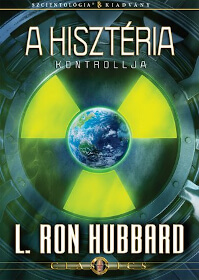L. Ron Hubbard
L. Ron Hubbard is perhaps best known as an author, as Founder of the Scientology religion, and as a great humanitarian who, after more than half a century of research into methods to better the human condition, left a legacy that improves people’s lives in innumerable ways. This legacy is recorded in an immense body of work that comprises tens of millions of words in articles, books and lectures.
Born in Tilden, Nebraska, on March 13, 1911, Mr. Hubbard spent his early years in what was then still the frontier territory of Montana. Possessed of a rare curiosity, one that motivated his ethnological examinations of 21 races and cultures and encouraged him while still in his teens to trek across a then remote China that few Westerners would ever see, he logged more than a quarter of a million miles by the time he reached the age of 19 - without the benefit of commercial air transportation.
By the time he enrolled in George Washington University in 1930 to study engineering, it was obvious that he had already embarked upon his life’s work - a search for solutions to man’s most perplexing problems and the creation of workable technologies that would improve all facets of life. By technology is meant the methods of application of the principles of something, as opposed to mere knowledge of the thing itself. Thus Mr. Hubbard’s technologies can be applied to improve conditions.
His accomplishments include a considerable body of work known as Study Technology. This contains his discoveries of the basic reasons why students fail to grasp a subject and of the barriers to full comprehension of what one is studying. And he developed methods by which anyone can improve his ability to learn and apply what he has studied. Today, his Study Technology is used in schools throughout the world - and is a major factor in the success of the Hubbard College of Administration, which utilizes it fully in all of its courses to the benefit of its students.
As for administration, realizing in 1950 that what passed for administration at the time was inconsistent and arbitrary, Mr. Hubbard turned his attention to that area and wrote the first of many papers on the subjects of management and organization. His first book on the subject, How to Live Though an Executive, published in 1953, recognized that the true role of an executive in any organization was to plan and supervise, and it detailed a communication system to improve functionality in any office or organization. Indeed, the book was a communication manual appropriate for any organization of any size. Three years later, his bookThe Problems of Work isolated the problems encountered on the job by everyone, from worker to Chief Executive Officer, and presented methods anyone could use to regain his or her enthusiasm for work.
In 1965, after years of continuing research into the forms and functions of organization, Mr. Hubbard announced his development of the seven-division organizing board, a major breakthrough that presented the most successful administrative pattern of operation for any group of any size. These seven divisions, which are each divided into departments, encompass all the actions that are performed or should be performed in any organization. Indeed, this organizational breakthrough, when standardly applied, ensures the continued success and stable expansion of all organizations.
The full body of his work in this area can be found in nine encyclopedia-sized volumes, including an index volume, comprising the Organization Executive Course, and the three Management Series volumes. Contained in these twelve volumes is technology that guarantees the survival and growth of groups from the small to the enormous, as has been proven in recent decades by thousands upon thousands of companies and groups in countries throughout the world.
After completing his work, L. Ron Hubbard departed this life on January 24, 1986. He accomplished all he had set out to do and his legacy continues to impact on the lives of millions. Mr. Hubbard once said,“I like to help others and count it as my greatest pleasure in life to see a person free himself of the shadows which darken his days.”
Today, millions in many fields utilize Mr. Hubbard’s principles to rid themselves of those shadows and better their lives.
